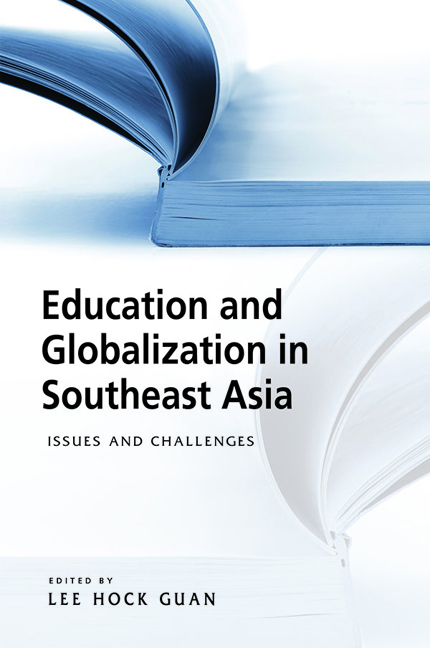Book contents
- Frontmatter
- Contents
- Acknowledgements
- Contributors
- Introduction
- 1 English in Singapore and Malaysia: Common Roots, Different Fruits
- 2 Globalization, Educational Language Policy and Nation-Building in Malaysia
- 3 Second-Order Change Without First-Order Change: A Case of Thai Internationalization of Higher Education
- 4 Higher Education in Malaysia: Access, Equity and Quality
- 5 Indonesian Higher Education: Gaps in Access and School Choice
- 6 Increasing Access to and Retention in Primary Education in Malaysia
- 7 Primary and Secondary Education in Myanmar: Challenges Facing Current Reforms
- Index
7 - Primary and Secondary Education in Myanmar: Challenges Facing Current Reforms
Published online by Cambridge University Press: 12 January 2018
- Frontmatter
- Contents
- Acknowledgements
- Contributors
- Introduction
- 1 English in Singapore and Malaysia: Common Roots, Different Fruits
- 2 Globalization, Educational Language Policy and Nation-Building in Malaysia
- 3 Second-Order Change Without First-Order Change: A Case of Thai Internationalization of Higher Education
- 4 Higher Education in Malaysia: Access, Equity and Quality
- 5 Indonesian Higher Education: Gaps in Access and School Choice
- 6 Increasing Access to and Retention in Primary Education in Malaysia
- 7 Primary and Secondary Education in Myanmar: Challenges Facing Current Reforms
- Index
Summary
INTRODUCTION
Since the political changes starting in 2011, the new quasi-civilian Myanmar government has announced a number of reforms to the education sector. For several decades before that, Myanmar had spent far less on education than any of its neighbours. When a government has failed to provide adequate education to enough citizens, many embrace decentralization as a strategy to improve their education system, often with the encouragement of international advisors and donors. The Myanmar government has stated that decentralization is a goal for their provision of basic education. It has also stated its intention to increase funding and the number of schools and teachers, increase the number of years of compulsory education, reform the curriculum, draft an education law, and reach out to non-state actors that have signed ceasefire agreements with the central government.
Against this background of long-term underfunding and neglect, what is the nature of, and prospects for, decentralization in education inMyanmar? Can decentralization be effective in addressing the deep-seated problems in the Myanmar education sector? To explore answers to these questions, we have examined relationships within the formal education system in the Ministry of Education across various levels of government, from the national down to the state or region, and below that to the district and township. We describe the provision of education starting from the colonial era in the late nineteenth century through to the present. We have also reviewed some of the non-state actors involved in the provision of education, especially as their involvement throws into relief challenges that the formal education system faces. We then present our findings, which suggest that of this writing (2014), decentralization, to the extent that is has happened at all, is limited. The institutional culture of the Ministry of Education, together with societal attitudes towards education and perceptions of the proper roles of students, teachers, and Ministry staff, all limit decentralization.
METHODOLOGY
We have based our findings on a literature review and on interviews with key participants and decision-makers in two regions, Mon State and Yangon Region. The purpose of this review and interviews was to gauge how people involved with the provision of education understand “decentralization”, what decisions and responsibilities have been handed down from higher to lower levels of administration, and how they understand their own role in the process.
- Type
- Chapter
- Information
- Education and Globalization in Southeast AsiaIssues and Challenges, pp. 166 - 194Publisher: ISEAS–Yusof Ishak InstitutePrint publication year: 2017

